Vulcan Materials Bundle
How Does Vulcan Materials Company Dominate the Construction Materials Market?
The infrastructure sector is booming, fueled by significant investments across the United States. At the heart of this growth lies Vulcan Materials Company, a key player in the Vulcan Materials SWOT Analysis. Understanding its competitive position is crucial for investors and strategists alike.
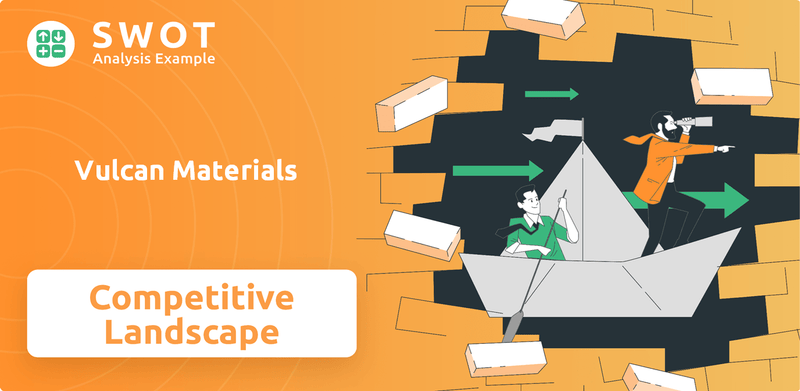
This analysis will dissect the competitive landscape of Vulcan Materials Company, providing a detailed market analysis. We'll explore its primary competitors, its strategic initiatives, and how it maintains its dominance in the aggregates industry. This deep dive into the company's financial performance compared to competitors will reveal valuable insights for informed decision-making.
Where Does Vulcan Materials’ Stand in the Current Market?
Vulcan Materials Company is the largest producer of construction aggregates in the United States, holding a significant position within the construction materials industry. Its core operations revolve around the production and supply of crushed stone, sand, and gravel, which are essential for construction projects. The company also produces asphalt mix and ready-mixed concrete, enhancing its vertical integration and control over the supply chain.
The company's value proposition lies in its ability to provide essential construction materials with a wide geographic reach. Vulcan serves a diverse customer base, including public sector infrastructure projects, commercial developments, and residential construction. This strategic positioning allows it to capitalize on the consistent demand for construction materials across various sectors.
Vulcan Materials Company maintains its position as the leader in the aggregates industry. It strategically focuses on high-growth areas across 20 states, the District of Columbia, and Mexico. This geographic focus allows the company to serve diverse customer needs effectively.
The company's financial health is robust, with strong revenue generation and profitability. In Q1 2025, Vulcan reported a 7.6% increase in total revenues to $1.55 billion. Aggregates shipments were up 1%, and the average sales price per ton increased by 7%.
Vulcan enhances its market position through organic growth and strategic acquisitions. These initiatives reinforce its leadership in key regional markets. The company consistently adapts to market changes and customer needs.
Vulcan's operational efficiency and pricing power are key to its success. The company's ability to manage costs and optimize pricing strategies supports its strong financial performance. This efficiency is crucial for maintaining its competitive edge.
Vulcan's market position is shaped by its extensive geographic presence and strategic focus on high-growth regions. The company's financial performance reflects its operational efficiency and pricing power within the
- Extensive geographic footprint across 20 states, the District of Columbia, and Mexico.
- Focus on high-growth urban and suburban markets to capitalize on demand.
- Strategic acquisitions to reinforce leadership in key regional markets.
- Strong revenue generation and profitability, with a 7.6% increase in total revenues in Q1 2025.
Vulcan Materials SWOT Analysis
- Complete SWOT Breakdown
- Fully Customizable
- Editable in Excel & Word
- Professional Formatting
- Investor-Ready Format
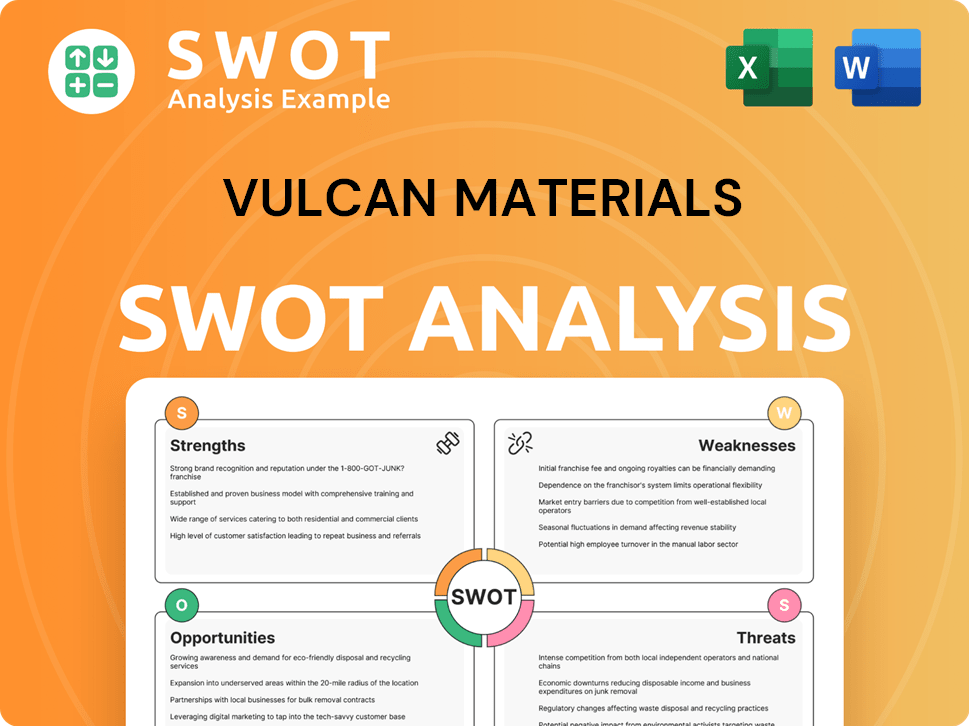
Who Are the Main Competitors Challenging Vulcan Materials?
The Owners & Shareholders of Vulcan Materials operates within a dynamic and competitive environment. The company faces competition from both large, established firms and numerous smaller, regional players in the aggregates industry. Understanding the competitive landscape is crucial for assessing its market position and strategic initiatives.
The competitive landscape for Vulcan Materials Company is shaped by the construction materials market, particularly in the aggregates industry. This includes crushed stone, sand, and gravel, essential for infrastructure and construction projects. The company's ability to maintain and grow its market share depends on its competitive advantages, pricing strategies, and geographic market presence.
Market analysis reveals that Vulcan Materials Company competes with a mix of publicly traded and privately held companies. The competitive intensity varies across different regions and product lines, influenced by factors such as transportation costs, local demand, and the availability of raw materials.
The primary competitors of Vulcan Materials Company include large, diversified players and smaller regional producers. These rivals compete across similar product lines, including crushed stone, sand, gravel, ready-mixed concrete, and asphalt. Competition often centers on securing major infrastructure projects and gaining market share in key construction hubs.
Martin Marietta is a major competitor, directly challenging Vulcan Materials Company in many geographic markets. They offer similar products, including crushed stone, sand, gravel, ready-mixed concrete, and asphalt. Their rivalry is evident in bids for infrastructure projects and market share battles in key construction areas.
Heidelberg Materials, through its U.S. operations, presents a significant competitive threat. They have an extensive network of quarries and production facilities, particularly in cement and aggregates. This broad presence allows them to compete effectively across various markets.
Numerous privately held aggregate companies also compete with Vulcan Materials Company. These companies often have strong local market penetration. They may offer competitive pricing due to lower overhead costs. Their localized focus allows them to respond quickly to regional market demands.
Indirect competition comes from alternative building materials and, to a lesser extent, the recycling of construction and demolition waste. While not a primary threat, these alternatives can influence market dynamics. Advancements in construction techniques and materials could shift the competitive landscape in the future.
The aggregates industry has seen consolidation through mergers and acquisitions. This can create larger, more formidable rivals or integrate supply chains. While no new entrants have significantly disrupted the market recently, the potential for future shifts remains.
Understanding the competitive advantages of Vulcan Materials Company is crucial for a thorough market analysis. These advantages can include factors like geographic diversification, efficient operations, and strong customer relationships. The company's ability to navigate economic cycles and adapt to changing market conditions is also key.
- Geographic Diversification: A broad presence across various regions can mitigate risks associated with localized economic downturns or natural disasters.
- Operational Efficiency: Streamlined operations and cost management are essential for maintaining profitability in a competitive market.
- Customer Relationships: Strong relationships with customers, including contractors and government agencies, can provide a competitive edge.
- Strategic Initiatives: Investments in technology and sustainable practices can enhance competitiveness.
- Financial Performance: Analyzing key financial metrics like revenue, profit margins, and return on investment is crucial for assessing performance against competitors.
Vulcan Materials PESTLE Analysis
- Covers All 6 PESTLE Categories
- No Research Needed – Save Hours of Work
- Built by Experts, Trusted by Consultants
- Instant Download, Ready to Use
- 100% Editable, Fully Customizable
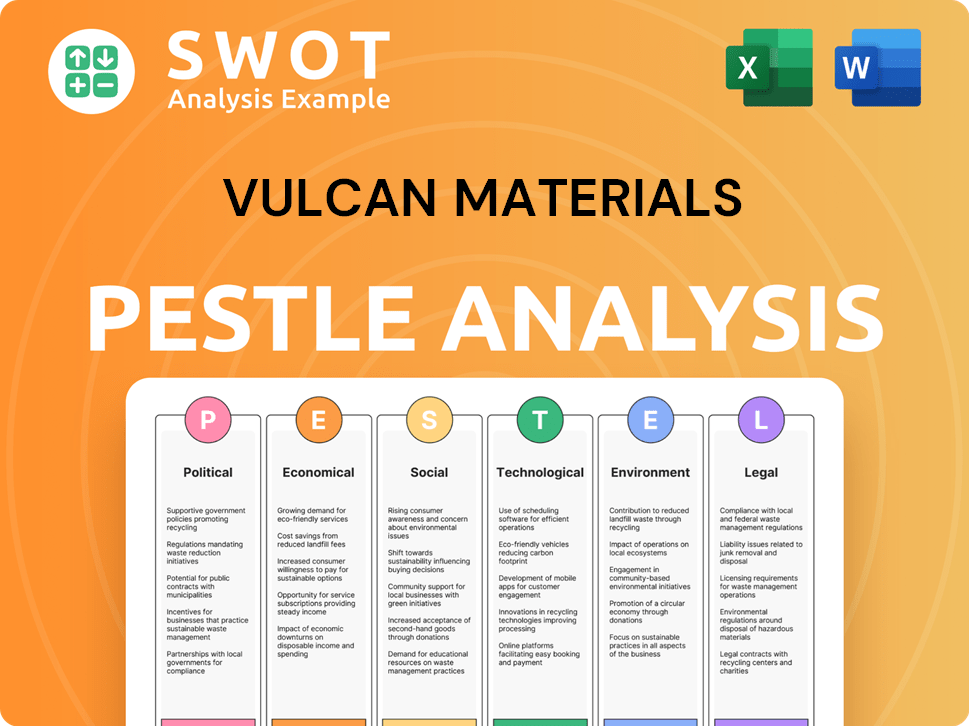
What Gives Vulcan Materials a Competitive Edge Over Its Rivals?
Understanding the competitive landscape of the construction materials sector, particularly for a major player like Vulcan Materials Company, is crucial for investors and industry analysts alike. This analysis delves into the key advantages that position Vulcan Materials Company favorably within the aggregates industry. Examining its strategic moves and competitive edge provides valuable insights into its market dynamics.
Vulcan Materials Company's success is underpinned by several strategic pillars. These include its extensive operational network, robust customer relationships, and a commitment to quality. The company's ability to navigate economic cycles and adapt to market changes further solidifies its position. For a deeper dive into the growth strategies employed by Vulcan Materials, consider exploring the Growth Strategy of Vulcan Materials.
The competitive landscape for Vulcan Materials Company is shaped by its ability to maintain and enhance these advantages. This involves continuous investment in operational efficiencies, strategic geographical positioning, and a focus on customer satisfaction. These factors collectively contribute to the company's sustained success.
Vulcan Materials Company benefits significantly from economies of scale as the largest producer of construction aggregates in the U.S. This scale allows for more efficient production, transportation, and distribution of materials. The company's vast network of over 400 active quarries supports its operational efficiency.
Vulcan strategically locates its facilities near major metropolitan areas and transportation corridors. This minimizes delivery costs and enhances responsiveness to customer demand. This extensive distribution network is a critical asset for timely and cost-effective supply.
Long-standing customer relationships and strong brand equity within the construction industry contribute to customer loyalty. The company's commitment to quality control and consistent product specifications differentiates it in the market. Vulcan's focus on customer satisfaction strengthens its competitive position.
Significant capital investment is required to establish and operate quarries, creating barriers to entry. The finite nature and permitting challenges associated with new aggregate reserves also make imitation difficult. These factors contribute to the sustainability of Vulcan's competitive advantages.
In recent years, Vulcan Materials Company has demonstrated robust financial performance. For example, in 2023, the company reported net earnings of approximately $1.2 billion. The company's strategic focus on operational efficiency and geographic diversification has allowed it to maintain a strong market position. The aggregates industry remains highly competitive, but Vulcan's scale and strategic advantages position it well for continued success.
- Vulcan Materials Company's market share in the U.S. aggregates market is significant, reflecting its scale.
- The company's revenue in 2023 was around $7.7 billion.
- Vulcan's strategic acquisitions and operational improvements have driven profitability.
- The company's focus on sustainability is becoming increasingly important in the construction materials sector.
Vulcan Materials Business Model Canvas
- Complete 9-Block Business Model Canvas
- Effortlessly Communicate Your Business Strategy
- Investor-Ready BMC Format
- 100% Editable and Customizable
- Clear and Structured Layout
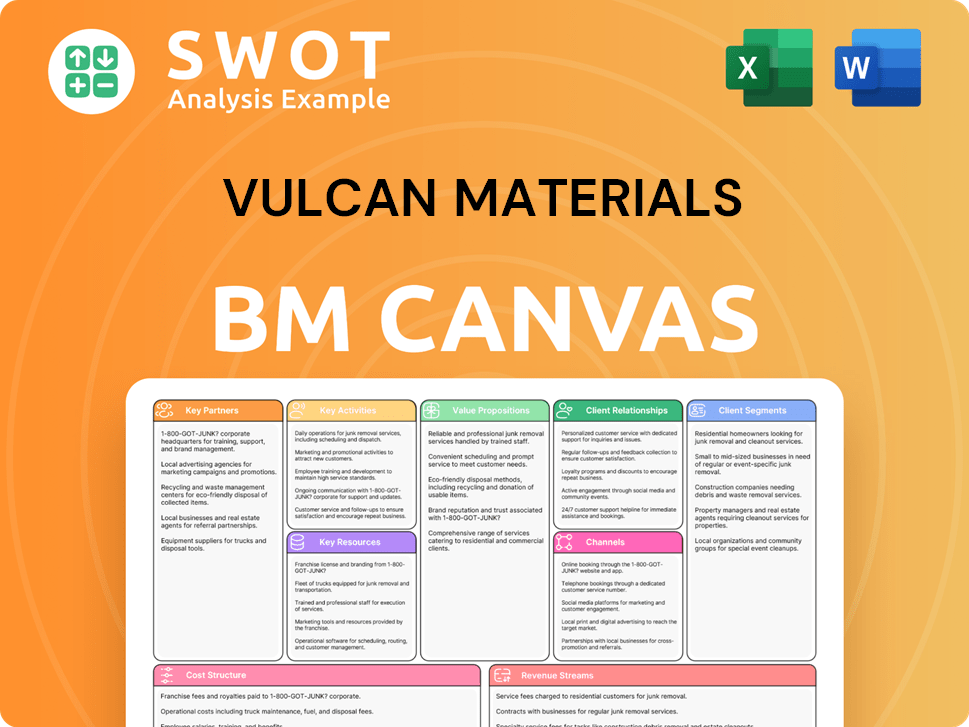
What Industry Trends Are Reshaping Vulcan Materials’s Competitive Landscape?
The competitive landscape for the construction materials industry, particularly for companies like Vulcan Materials Company, is shaped by a complex interplay of industry trends, future challenges, and emerging opportunities. A thorough market analysis reveals that understanding these factors is crucial for assessing the company's strategic positioning and potential for future growth. The aggregates industry, which Vulcan Materials Company heavily relies on, is sensitive to economic cycles and infrastructure spending, making it essential to evaluate both risks and opportunities.
Vulcan Materials Company's strategic initiatives are closely tied to the broader economic environment and industry-specific dynamics. The company's ability to navigate these factors will significantly influence its financial performance compared to competitors. Furthermore, the company's geographic market presence and pricing strategies play a critical role in its competitive advantages, which are constantly tested by market fluctuations and the actions of its main rivals.
The aggregates industry is seeing increased automation and data analytics to optimize operations. Environmental regulations are becoming stricter, impacting operational costs. Demand is driven by infrastructure spending and global economic conditions. Consumer preferences are subtly influencing material specifications, favoring sustainable and resilient infrastructure.
Rising operating costs due to environmental compliance and increased competition pose challenges. Economic downturns or higher interest rates could slow construction activity. Softening in residential construction could impact certain segments. Navigating supply chain disruptions and ensuring efficient logistics are ongoing concerns.
Continued bipartisan support for infrastructure spending, like the Bipartisan Infrastructure Law, fuels sustained demand. Developing sustainable aggregate production methods and exploring recycled content offers growth prospects. Strategic acquisitions in high-growth markets can expand market share. Operational optimization and leveraging infrastructure spending are key strategies.
Vulcan Materials Company is likely to continue operational optimization and focus on strategic acquisitions. The company will leverage infrastructure spending to maintain its competitive edge. Sustainability efforts and exploring recycled content in products are also important. Financial performance will be closely tied to these initiatives.
The aggregates industry's performance is closely tied to infrastructure spending and economic cycles. In 2024, the construction materials market is expected to grow, supported by government spending on infrastructure projects. The Bipartisan Infrastructure Law, enacted in 2021, allocated substantial funds for roads, bridges, and other critical projects, providing a significant boost to the sector. The market analysis indicates that companies with a strong geographic presence and efficient operations are well-positioned.
- Vulcan Materials Company's market share analysis shows a strong position in key regions.
- The company's financial performance has been robust, driven by increased demand and strategic acquisitions.
- Recent acquisitions and mergers have expanded Vulcan's geographic market presence and enhanced its competitive advantages.
- Sustainability efforts, including exploring recycled content, align with evolving market demands and environmental regulations.
Vulcan Materials Porter's Five Forces Analysis
- Covers All 5 Competitive Forces in Detail
- Structured for Consultants, Students, and Founders
- 100% Editable in Microsoft Word & Excel
- Instant Digital Download – Use Immediately
- Compatible with Mac & PC – Fully Unlocked
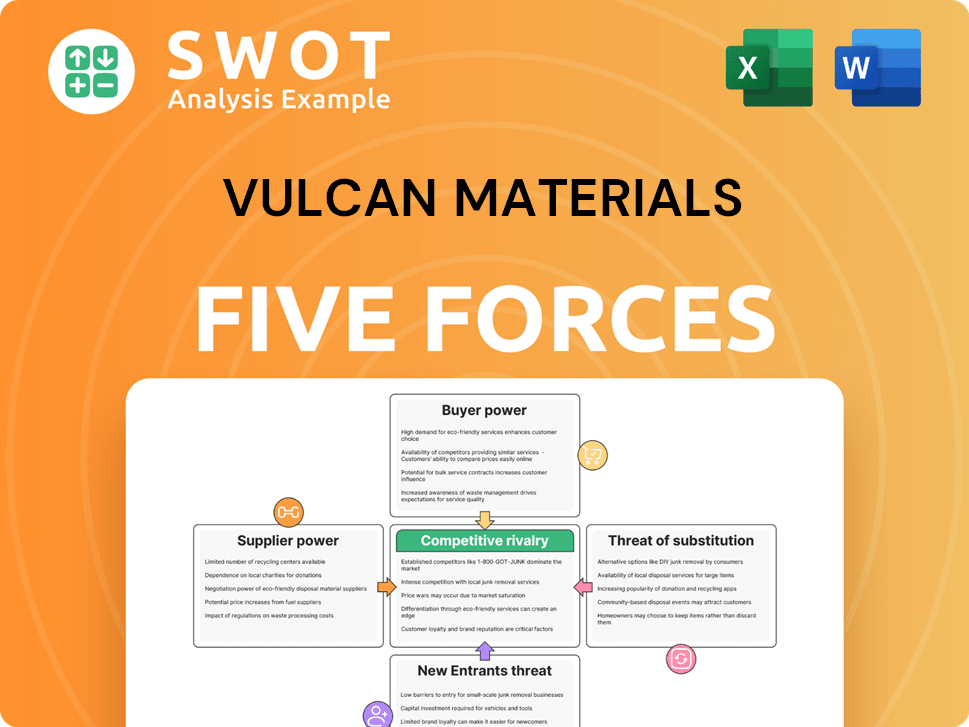
Related Blogs
- What are Mission Vision & Core Values of Vulcan Materials Company?
- What is Growth Strategy and Future Prospects of Vulcan Materials Company?
- How Does Vulcan Materials Company Work?
- What is Sales and Marketing Strategy of Vulcan Materials Company?
- What is Brief History of Vulcan Materials Company?
- Who Owns Vulcan Materials Company?
- What is Customer Demographics and Target Market of Vulcan Materials Company?
Disclaimer
All information, articles, and product details provided on this website are for general informational and educational purposes only. We do not claim any ownership over, nor do we intend to infringe upon, any trademarks, copyrights, logos, brand names, or other intellectual property mentioned or depicted on this site. Such intellectual property remains the property of its respective owners, and any references here are made solely for identification or informational purposes, without implying any affiliation, endorsement, or partnership.
We make no representations or warranties, express or implied, regarding the accuracy, completeness, or suitability of any content or products presented. Nothing on this website should be construed as legal, tax, investment, financial, medical, or other professional advice. In addition, no part of this site—including articles or product references—constitutes a solicitation, recommendation, endorsement, advertisement, or offer to buy or sell any securities, franchises, or other financial instruments, particularly in jurisdictions where such activity would be unlawful.
All content is of a general nature and may not address the specific circumstances of any individual or entity. It is not a substitute for professional advice or services. Any actions you take based on the information provided here are strictly at your own risk. You accept full responsibility for any decisions or outcomes arising from your use of this website and agree to release us from any liability in connection with your use of, or reliance upon, the content or products found herein.